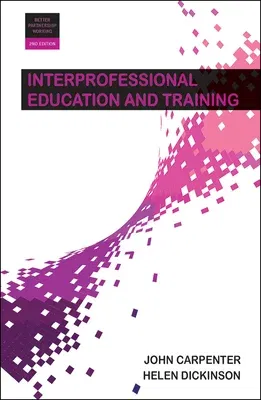John Carpenter
(Author)Interprofessional Education and TrainingPaperback, 1 August 2016

Qty
1
Turbo
Ships in 2 - 3 days
Only 2 left
Free Delivery
Cash on Delivery
15 Days
Free Returns
Secure Checkout

Part of Series
Better Partnership Working
Print Length
144 pages
Language
English
Publisher
Policy Press
Date Published
1 Aug 2016
ISBN-10
1447329805
ISBN-13
9781447329800
Description
Product Details
Authors:
Book Format:
Paperback
Country of Origin:
GB
Date Published:
1 August 2016
Dimensions:
20.07 x
12.95 x
3.56 cm
Genre:
Social Work Aspects
ISBN-10:
1447329805
ISBN-13:
9781447329800
Language:
English
Pages:
144
Publisher:
Series:
Weight:
816.47 gm